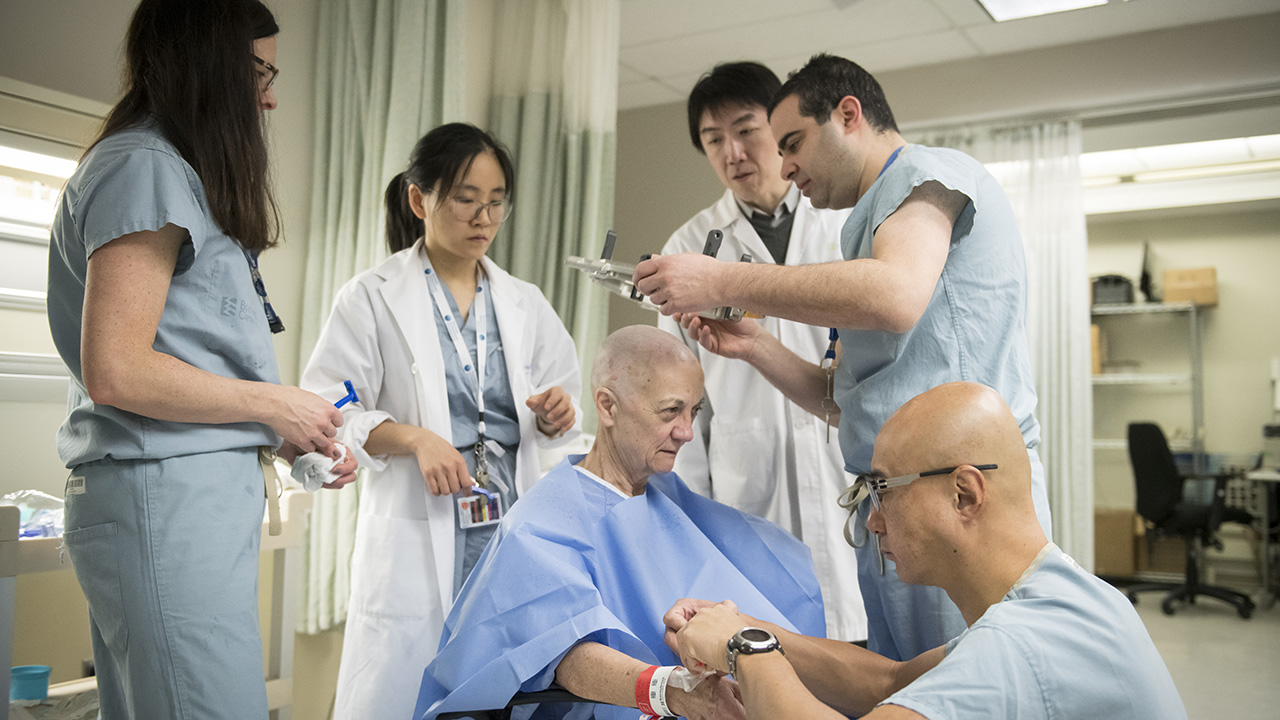World first: Blood-brain barrier opened in multiple regions in a patient with Alzheimer’s disease
For the first time, Sunnybrook researchers have temporarily opened the blood-brain barrier (BBB) using MRI-guided focused ultrasound (FUS) in multiple regions of the brain in a patient with Alzheimer’s disease (AD). Areas being targeted in this trial include the hippocampus and parietal lobes, which are critical for cognition, memory and learning that show amyloid deposits in pre-treatment brain scans. Amyloid and tau are proteins that build up plaque and form tangles in these areas as AD progresses.
“It is important to establish that opening the blood-brain barrier in these critical brain structures, repeatedly, is safe,” says Dr. Nir Lipsman, principal investigator of the trial and director of the Harquail Centre for Neuromodulation at Sunnybrook Health Sciences Centre. “We are also determining what influence this may have on amyloid deposits in patients with Alzheimer’s disease. We will measure this using brain scans, spinal fluid and blood analysis, as well as behavioural tests.”
“The launch of Phase 2 is taking our study to the next level as we investigate innovative treatments,” says Dr. Sandra Black, study co-principal investigator and Professor of Medicine (Neurology) at Sunnybrook and the University of Toronto. “The ultimate goal is to develop direct-to-brain therapies that may one day help in treatment and early prevention for patients with Alzheimer’s disease.”
Drug therapies and medications are not being administered in this Phase 2 trial, which is investigating the safety and feasibility of using low frequency FUS to open the BBB in AD. This study was developed as a direct result of important pre-clinical findings by Sunnybrook researchers, that showed that opening the BBB alone with FUS may help reduce plaque associated with AD and stimulate the growth of new brain cells.
This Phase 2 trial is funded by a grant from the Weston Brain Institute. Vital advancements like this are made possible through the generous support of Sunnybrook donors.
AD destroys brain cells causing the deterioration of memory and cognition and is the most common form of dementia. Over 564,000 Canadians are currently living with dementia. That number is expected to rise to 937,000 by 2031.
“I realize this trial may not help me, but if it helps somebody down the road, then that's a good thing,” says Sally McMillan, the first patient in the world to be treated in this Phase 2 trial.
The BBB prevents compounds in the bloodstream from entering the brain. While it protects the brain, it also blocks potential therapies and medication that could help treat brain disorders.
In the study, microbubbles are injected into a patient’s bloodstream. MRI-guided FUS targets these microbubbles with thousands of low frequency ultrasound waves causing them to vibrate and temporarily open the BBB in patients with AD.
In Phase 1 of the trial, Sunnybrook researchers demonstrated that FUS can be used to safely open the BBB in patients with AD.
30 participants, women and men ages 50-58 who have been diagnosed with AD, are being recruited for the Phase 2 portion of the trial, and will be treated once every two weeks over a six-week period.
For more information about focused ultrasound at Sunnybrook Health Sciences Centre, visit sunnybrook.ca/focusedultrasound
Media Contact:
Jennifer Palisoc
Sunnybrook Health Sciences Centre
416-480-4040
jennifer.palisoc@sunnybrook.ca
Watch to learn more about this world first:
Our researchers are testing technology that they hope could one day help treat or prevent Alzheimer’s disease.
— Sunnybrook Hospital (@Sunnybrook) January 24, 2019
In a world first, they are using focused ultrasound to open the blood-brain barrier in multiple regions in patients with Alzheimer’s disease: https://t.co/qzQywIAhmT pic.twitter.com/BYMJNkMP99








